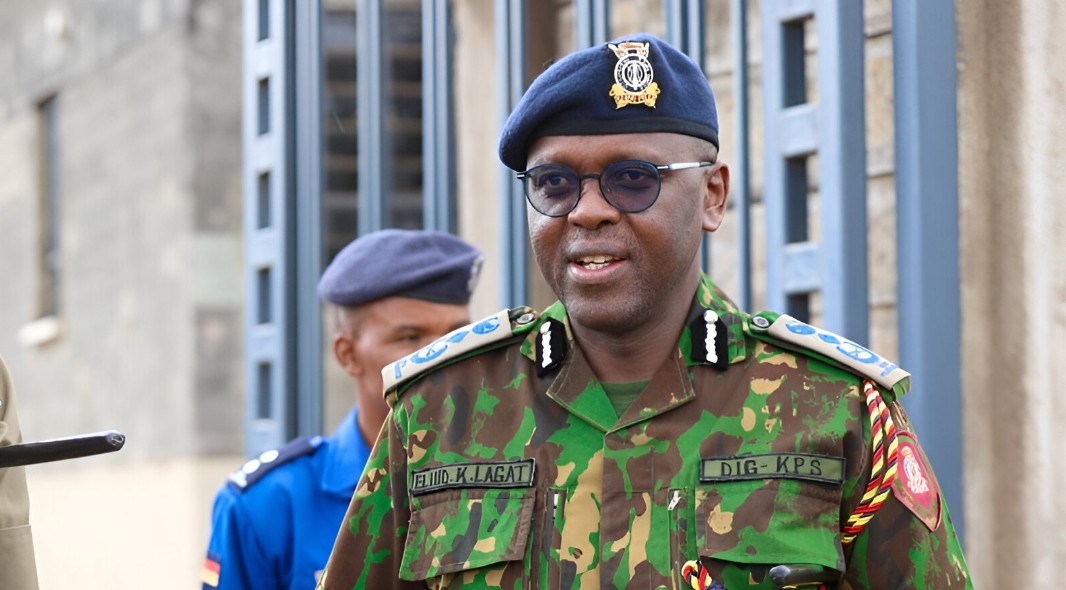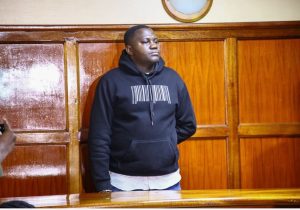News
DIG Lagat Ordered Ojwang Torture, Constable Confesses
“Ojwang was not meant to be killed but to be disciplined as per instruction of the OCS Talaam, who was under the instruction of DIG Lagat. I am sorry for the death of Ojwang.”

Police officer breaks silence on brutal killing of blogger Albert Ojwang, implicating top police brass in custody death scandal
In a shocking turn of events that has sent ripples through Kenya’s law enforcement hierarchy, Police Constable James Mukhwana has broken his silence over the brutal killing of blogger and teacher Albert Ojwang, revealing chilling details that directly implicate Deputy Inspector General of Police Eliud Lagat in ordering the fatal assault.
Mukhwana, currently in custody over Ojwang’s death on June 7, 2025, has provided investigators with a blow-by-blow account of the night that has exposed what appears to be a systematic cover-up involving senior police officials at the Central Police Station.
The Night of Terror
According to Mukhwana’s detailed statement to the Independent Policing Oversight Authority (IPOA), the chain of events began during his shift when he was summoned to the office of Officer Commanding Station (OCS) Samson Talaam. There, he received what he describes as a direct order that would prove fatal.
“There is a directive from DIG Lagat. Do you know him? There are officers from the DCI headquarters bringing a suspect here at 8:00 p.m. Tell the inmates to discipline him a bit,” Mukhwana alleges he was told by OCS Talaam.
When the constable raised concerns about potential consequences, he claims he was warned against questioning orders as a junior officer and told that disobedience could cost him his position.
At approximately 9:00 p.m. that evening, a black Subaru arrived at the Central Police Station carrying Albert Ojwang in handcuffs. After confirmation from OCS Talaam that this was indeed the suspect in question, Ojwang was booked into custody at 9:20 p.m.
The Fatal Assault
What followed was a coordinated assault that Mukhwana describes in harrowing detail. Four inmates – Collins Ireri, Gil Ammiton, Brian Mwaniki, and Erick Ndambuki – were allegedly instructed to carry out the beatings in the last cell opposite the toilets. All four have since been arrested and arraigned in court.
As the violence escalated, Mukhwana claims he and fellow officer PC Kimani rushed to intervene. They found Ojwang bleeding and leaning against the wall, prompting Mukhwana to immediately request that Deputy OCS Samuel Nganga take the victim to hospital. Mukhwana left for home around 10:00 p.m., unaware that Ojwang would not survive the night.
The Cover-Up Unravels

Police officer James Mukhwana has come forward to reveal the events surrounding the case of Albert Ojwang. He admitted that he was ordered to “discipline” Ojwang, stating that the instructions came from Lagat through Talaam.
The following day brought a barrage of phone calls from colleagues inquiring about Ojwang’s condition. When Mukhwana contacted Deputy OCS Nganga for clarification, he was directed to call OCS Talaam, who reportedly dismissed his concerns, claiming “things were not bad” and that they were “safe.”
By June 11, however, the net was closing. Mukhwana was summoned by IPOA to record a formal statement. In a damning admission, he confesses that his initial testimony was false – part of what he describes as “a pact among the officers to cover for one another.”
The turning point came when Mukhwana realized he was being made a scapegoat by his colleagues. Haunted by guilt and the weight of the truth, he returned to IPOA on June 12, requesting to record a second, honest statement. He was subsequently arrested and taken to Capitol Hill Police Station.
A Confession Born of Guilt
In his emotional conclusion to investigators, Mukhwana provided what may be the most significant admission in the case:
“This is the truth of what happened. Ojwang was not meant to be killed but to be disciplined as per instruction of the OCS Talaam, who was under the instruction of DIG Lagat. I am sorry for the death of Ojwang. May God help them to heal the loss. I know it is painful.”
Seeking Protection
Through his legal team – Kevin Ondago, Clinton Mwale, and Bietta Wavinya – Mukhwana has requested placement under witness protection, stating his readiness to reveal the complete truth. Significantly, his lawyers say he has instructed them not to seek bail, citing serious concerns over his personal safety.
The legal team has also reported being trailed and intimidated by individuals believed to be police officers, with a formal complaint lodged at Capitol Hill Police Station.
High-Level Implications
The allegations against Deputy Inspector General Eliud Lagat represent one of the most serious accusations of police brutality and cover-up in recent Kenyan history. Despite OCS Talaam’s public attempts to distance himself from the murder allegations, Mukhwana’s testimony paints a picture of a command structure that allegedly sanctioned what was intended as “discipline” but resulted in death.
The case has already prompted significant developments, with President Ruto offering condolences to Ojwang’s family and donating KSh 2 million, while calls for comprehensive police reforms grow louder.
A System Under Scrutiny
This case highlights systemic issues within Kenya’s police service, where junior officers claim to follow orders from superiors without questioning their legality or morality. Mukhwana’s confession reveals not just the mechanics of how Ojwang died, but the culture of impunity and cover-up that allegedly permeates the force.
As investigations continue, the focus now shifts to whether senior police officials, including DIG Lagat, will be held accountable for their alleged roles in this tragedy. The case serves as a stark reminder of the urgent need for police accountability and the protection of citizens’ rights while in custody.
The death of Albert Ojwang has become more than just a murder case – it has exposed the alleged rot within Kenya’s law enforcement system and raised fundamental questions about who watches the watchers.
Kenya Insights allows guest blogging, if you want to be published on Kenya’s most authoritative and accurate blog, have an expose, news TIPS, story angles, human interest stories, drop us an email on [email protected] or via Telegram
-

 Business5 days ago
Business5 days agoCooking Fuel Firm Koko Collapses After Govt Blocks Sh23bn Carbon Deal
-

 Americas4 days ago
Americas4 days agoEpstein Files: Bill Clinton and George Bush Accused Of Raping A Boy In A Yacht Of ‘Ritualistic Sacrifice’
-

 Politics2 weeks ago
Politics2 weeks agoYour Excellency! How Ida’s New Job Title From Ruto’s Envoy Job Is Likely to Impact Luo Politics Post Raila
-

 Business4 days ago
Business4 days agoABSA BANK IN CRISIS: How Internal Rot and Client Betrayals Have Exposed Kenya’s Banking Giant
-

 Business2 weeks ago
Business2 weeks agoMinnesota Fraud, Rice Saga, Medical Equipment Deal: Why BBS Mall Owner Abdiweli Hassan is Becoming The Face of Controversial Somali Businessman in Nairobi
-

 News2 weeks ago
News2 weeks agoKenya Stares At Health Catastrophe As US Abandons WHO, Threatens Billions In Disease Fighting Programmes
-

 News2 weeks ago
News2 weeks agoDCI Probes Meridian Equator Hospital After Botched Procedure That Killed a Lawyer
-

 Investigations1 week ago
Investigations1 week agoPaul Ndung’u Sues SportPesa for Sh348 Million in UK Court, Accuses Safaricom Boss of Sh2.3 Billion Conspiracy














